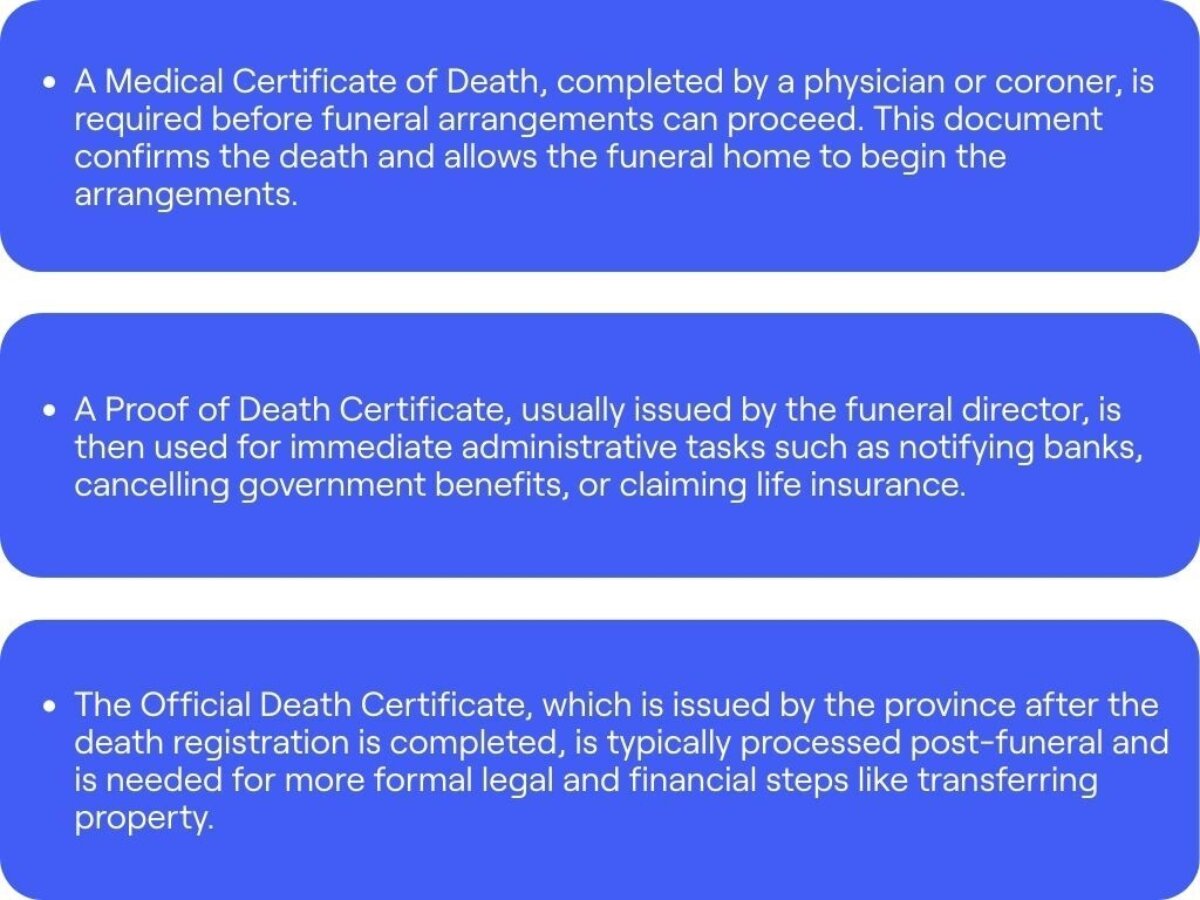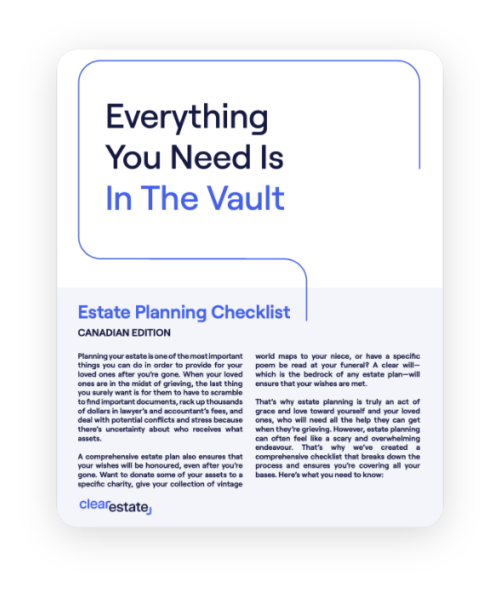Estate Planning
Oct 27, 2025
Introducing Empathy to Estate Bureaucracy
ClearEstate’s origin story: how grief, inefficiency, and compassion inspired Alex to build a fintech that brings empathy and efficiency to estate planning and settlement
A step-by-step guide to beginning estate executorship


Losing someone you love is devastating, and it’s often followed by a whirlwind of administrative, legal, and emotional responsibilities. In Canada, there are specific steps to take after a death, from getting a legal death certificate to cancelling government services.
Generally, before death, the deceased appoints an executor, or a liquidator in Québec, whose role is to ensure that the estate runs smoothly. It is this person who takes charge of the various steps following a person's death.
If you have been appointed executor, this article is for you, as it will guide you step by step to ensure that everything goes smoothly. We know it's a big responsibility, but ClearEstate is here to help.
When someone dies, the first thing to do is get a death certificate. This is followed by notifying close family members and securing the deceased's belongings.
The death of a loved one initiates a series of immediate steps that need to be taken, ranging from legal paperwork to notifying relevant institutions. These steps help ensure that the deceased’s estate is managed properly and that the surviving family members can focus on grieving and healing. Here's a detailed breakdown of what happens after a death and how you can navigate these difficult tasks with clarity.
Help yourself stay on track with our downloadable PDF checklist for Canadian executors, designed to walk you through every essential step.
The first step in settling a loved one’s estate is obtaining official documentation of their passing. In most everyday scenarios, a Funeral Director’s Statement of Death is often sufficient, especially when dealing with banks, insurance companies, and other institutions.
However, a provincial death certificate may still be required for certain legal and government-related tasks, such as transferring property titles or applying for estate-related benefits
Executors will need to request several copies of the certificate to ensure they can handle all the necessary paperwork for settling the estate.
Who provides the certificate in Canada?
While a physician or coroner provides proof of death, you can typically request the death certificate from the provincial or territorial government once the death registration process is completed.
This process is usually initiated by the funeral home, which submits the necessary documents on behalf of the family. The timelines and procedures can vary by province, for example, in Ontario, death certificates are processed by ServiceOntario, whereas in British Columbia, the process is handled by Vital Statistics BC.
Executors or family members may need multiple copies of the death certificate to settle the estate, claim benefits, and notify institutions. In cases where the initial proof of death from a funeral director suffices (such as for insurance claims), the legal certificate might not be immediately required—but it is strongly recommended to request it to avoid delays in the estate settlement process.
Is it needed before making funeral plans?
It depends on the type of certificate.

Notifying family, friends, and authorities is a crucial step in the estate settlement process, as it sets the foundation for the legal and administrative actions that follow. This step is not only necessary to ensure that the deceased's wishes are carried out but also to prevent any unauthorized actions regarding their estate and personal affairs.
The first step is to inform immediate family members, followed by close friends and others close to the deceased. When delivering the news, be compassionate and clear to help them understand the situation.
The executor should prioritize informing the immediate family and then contact extended relatives and friends. After that, the executor should proceed to notify relevant authorities, including government agencies and financial institutions to begin the process of securing the deceased's assets and accounts.
Locating the will and other key documents is a critical step in the estate settlement process. The will outlines the deceased's wishes for the distribution of their assets, and it’s essential to find it as soon as possible.
Once located, the will will guide the executor in ensuring that the deceased’s assets are distributed according to their wishes.
A will can typically be found in the deceased’s personal belongings, such as a safe, filing cabinet, or a designated location they used for important documents. If a digital will exists (only valid in BC), it may be stored in a secure digital vault or email account.
The executor should start by checking places where the deceased may have stored legal documents, including physical and digital locations. It’s a good idea to contact ClearEstate for expert guidance in managing the estate settlement process. We can help determine if the deceased had a will.
If there is no will, the estate will be distributed according to the laws of intestate succession in your jurisdiction. In this case, the deceased's assets will be distributed among their family members based on a predetermined order of priority.
Dying without a will increases the complexity of the process, and the court will often appoint an administrator to handle the estate. The administrator will need to follow the legal steps for intestate succession and ensure that all parties with legal claims to the estate are notified.
Since intestate succession laws vary across provinces, it’s essential to refer to the rules specific to your jurisdiction.
Below are detailed instructions for each province:
Securing the property, pets, and mail of a deceased person is an essential step in estate settlement. As the executor, you must act quickly to protect the deceased's assets, ensure pets are cared for, and manage the flow of mail. Failing to secure these items can lead to potential losses, legal complications, and unnecessary delays in the estate settlement process. This step is essential to ensure that nothing is overlooked as you begin to settle the details and steps of the estate that are your responsibility.
If the deceased owned vehicles or real estate, it's critical to take immediate action to protect these assets. Begin by securing all vehicles to prevent unauthorized use. This may involve collecting the keys, moving the vehicle to a secure location, and notifying anyone who may have access. Contact the deceased’s auto insurance provider to report the death and determine whether the policy should be transferred, updated, or canceled. In most provinces, transferring vehicle ownership requires submitting a copy of the death certificate and proof of executor status to the provincial motor vehicle registry.
For real estate, take steps to secure the property as soon as possible. Change the locks and secure all windows and entry points to prevent unauthorized access. If the property will remain vacant during the estate settlement process, consider scheduling regular visits or hiring a property manager to keep an eye on it. Ongoing maintenance, such as lawn care or snow removal, is important to preserve the home’s value and avoid municipal bylaw issues.
Additionally, update the homeowner’s insurance policy to reflect the new situation and ensure continuous coverage. Make sure property taxes and utility bills continue to be paid, as unpaid accounts can lead to penalties or service disruptions.
To forward a deceased person’s mail, you can contact Canada Post to set up a mail forwarding service. This ensures that any important documents, bills, or communications related to the deceased’s affairs are directed to the executor or a trusted person for proper handling.
Immediately arrange for the care of any pets owned by the deceased. This could involve placing them with family members, friends, or a local animal shelter. For valuables, ensure they are secured in a safe location, such as a safety deposit box, to prevent theft or damage before their proper distribution from the estate.
Making funeral arrangements is an essential task for the executor after the death of a loved one. It is a highly sensitive time, and the arrangements should be handled with care, while also being mindful of the deceased's wishes and the family's needs. Executors should ensure that funds from the estate are used appropriately to cover the costs, as the financial responsibility often falls to the estate.
To organize a funeral in Canada, you must first contact a funeral home, which will guide you through the process of arranging services, selecting options, and organizing a memorial service. The funeral home will also assist with obtaining the necessary permits, handling transportation of the body, and working with local authorities to ensure everything is legally compliant.
If no funeral plans were made in advance, the executor will need to work with the family to decide on the preferred method of service. If the deceased did not leave clear funeral instructions, the next step is usually to follow the preferences of immediate family members. Funeral costs are legally considered estate expenses, which means they are paid from the estate before any distribution to beneficiaries. It's important to review the deceased’s available assets and ensure funds are allocated appropriately, without the need for personal out-of-pocket payments from family members when the estate can cover them.
The estate settlement process begins once you have addressed immediate post-death concerns such as securing property, pets, and making funeral arrangements. This step involves legally transferring assets, paying debts, and ensuring that the estate is handled according to the deceased’s will or, in the absence of a will, following applicable intestate succession laws.
As the executor, it’s your responsibility to follow the legal requirements for settling the estate. This can be a lengthy process depending on the size of the estate, the complexity of the assets, and the presence of any potential legal disputes. The goal is to ensure that the deceased’s wishes are respected and that the estate is administered in accordance with the law.
Here’s an overview of key actions involved in beginning the estate settlement process:
File the Will for Probate (if applicable): If the deceased left a valid will, it must be submitted to the probate court along with the probate application for validation. This is essential before proceeding with asset distribution. Probate ensures that the will is legally recognized and that the executor is authorized to carry out the instructions specified in the will.
Notify Beneficiaries: You are required to notify all beneficiaries named in the will, and there may be additional notice requirements depending on the province in which the estate is being administered. This notification serves to inform beneficiaries that an application for probate is being made to validate the will and confirm the executor’s legal authority. Beneficiaries typically receive a copy of the will (or relevant excerpt) along with details about their entitlements, and are given the opportunity to contest the validity of the will if they choose to do so.
Gather and Secure Assets: Compile a comprehensive inventory of all assets, including real estate, bank accounts, investments, personal property, and other valuables. It’s crucial to secure these assets to prevent any loss or mismanagement before distribution.
Obtain Letters of Administration or a Letter of Probate: Depending on the jurisdiction and whether there is a valid will, you may need to obtain Letters of Administration (if no will) or Letters of Probate (if a will exists). These legal documents grant the executor the authority to administer the estate, deal with assets, and distribute property.
Set Up an Estate Account: Open a dedicated estate account for the funds of the deceased. This account will be used to deposit assets and pay the debts, taxes, and expenses of the estate. It ensures proper accounting and avoids mixing personal and estate funds.
Pay Debts and Taxes: Identify and settle any / debts, including funeral expenses, medical bills, and other liabilities. Additionally, you will need to file the final income tax return for the deceased, and determine if estate taxes or other provincial taxes are owed. This can be one of the most complex parts of the settlement process and may require estate settlement services like ours.
Distribute Assets: Once all debts and taxes are settled, the remaining estate can be distributed according to the terms of the will or intestate succession laws. It is essential to follow the directions specified in the will precisely, and any discrepancies should be addressed legally.
In Canada, the necessity for an executor to file a final accounting of the estate with the court varies by province. In British Columbia, an executor is generally required to have their estate accounts approved by the court, a process known as the "passing of accounts." This is mandatory if all beneficiaries do not consent in writing, or if any beneficiary is legally incapable of providing consent, such as minors or individuals under legal disability. In contrast, in provinces like Quebec, executors are not typically required to file a final accounting with the court. Instead, they must provide beneficiaries with a final statement of accounts and obtain their consent before distributing the estate.
Given these variations, it is crucial for executors to consult with estate professionals familiar with the requirements of their specific province to ensure compliance with local requirements.
The estate settlement process requires precision, organization, and a deep understanding of legal obligations. As an executor, you are held to a high standard of responsibility, ensuring that everything from asset management to the final distribution is executed flawlessly. It’s essential to work closely with estate settlement professionals to navigate the complex nature of the process, ensuring that everything is completed according to the law and in the best interest of the beneficiaries.
After a loved one passes away, it's crucial to cancel or freeze accounts and notify relevant authorities to ensure that no further obligations are incurred in their name. This step helps protect the estate from unnecessary liabilities and ensures compliance with the legal and financial requirements of the settlement process. As the executor, you will need to contact various institutions, government agencies, and organizations to properly close accounts and update records.
The process may involve informing financial institutions, canceling credit cards, stopping government benefits, and more. Ensuring that these accounts are managed quickly and accurately helps to avoid fraud, continuing charges, or complications with tax filings.
Upon a person’s death, the Canada Revenue Agency (CRA) must be notified immediately to halt any ongoing tax obligations or benefit payments. It is essential to inform the CRA of the death and ensure that all necessary tax filings are completed, including the final return for the year of death. Government benefits, such as the Canada Pension Plan (CPP), must also be addressed—either canceled or transferred depending on the circumstances and eligibility of surviving family members. If the deceased had a will, the executor is responsible for applying for the CPP death benefit. In the absence of a will or appointed executor, the benefit may instead be claimed by the person who paid for the funeral expenses, the surviving spouse or common-law partner, or the next of kin, following that order of priority.
Don’t forget to contact the deceased's financial institutions to close bank accounts, credit cards, and other financial services. Most financial institutions will require a death certificate and proof of executor status before proceeding with closing the accounts.
The deceased's debts do not simply disappear after death; they are paid from the estate before any assets are distributed to beneficiaries. As the executor, you will need to identify all outstanding debts, including mortgages, credit card balances, personal loans, and unpaid bills. It is crucial to assess whether the estate has sufficient assets to cover these debts.
If the estate is solvent (meaning there are enough assets), the debts will be paid in a legally established order. If the estate is insolvent (it lacks enough assets to cover the debts), the estate may need to go through a formal process of debt settlement, potentially involving legal proceedings. It's important to communicate with creditors and understand the full scope of liabilities before moving forward with any distributions.
ClearEstate has supported thousands of families across North America through the estate settlement process since 2020. Our professionals and our digital platform are designed to provide clarity, reduce stress, and ensure nothing is left behind. We offer peace of mind when it matters most.
 Secure Your Legacy
Secure Your Legacy
Get your free 12-step Estate Planning checklist now. 89% of readers complete their estate plan within 3 months of using our guide.
Instantly Access Now